Through this article we’re going to look at Why Foraging Is Good For Our Health And The Planet from picking a little in your park to heading out to the wild to sustain you and your family.
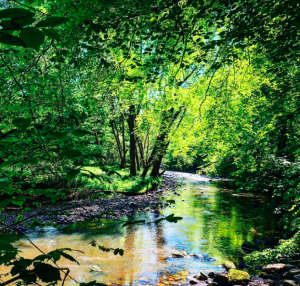
It’s a fact. Our urban parks had never been so busy as during the first lockdown of 2020. Suddenly everyone was out there, taking their daily outdoor allowance in their local wildish spaces, when previously, the notion of simply heading out for a wander every day purely for the sake of getting outside, would never have occurred to a lot of people.
Whilst it’s certainly quietened down out there, many people have kept up the habit of making time to spend outdoors regularly. And why not? The health benefits are well documented.
Why Foraging Is Good For Our Health And The Planet
Foraging reduces our stress levels
Having access to green space is associated with lower stress levels, (Thompson et al., 2012), and a reduction in the symptoms of depression and anxiety, (Beyer et al., 2014).
There is also growing evidence to show that children with attention deficit disorders, who spend time outdoors interacting with nature, have improved cognitive abilities, (Taylor and Kuo, 2009). This was also the case for adults suffering from depression. A study by Berman et al., 2012, found that adults who regularly engaged in nature based activities outdoors, showed significant cognitive gains.
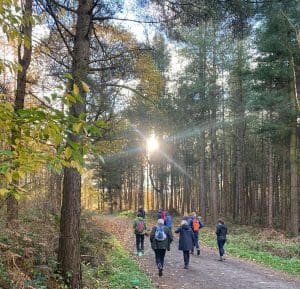
So what’s actually happening? Why does spending time outdoors in green spaces have such a positive impact on our health?
The surprising answer is that it’s actually the chemicals produced by plants and trees to protect themselves from predators, terpenes, which have such a profound effect on our mental state, (Gershenzon, J and Dudareva, N, 2010).
The plants and trees help us
We all know how relaxing the smell of Lavender or Chamomile can be and how uplifting the scent of Conifers are. That’s due to the terpenes in their aromatic oils. Walking through a forest or woodland exposes us to large doses of different terpenes found in many trees and plants. It’s almost as if our green friends are trying to calm us down and persuade us to stop acting so destructively towards the planet!
How many times have you found yourself wandering through a woodland on a damp autumn day breathing in huge lungful’s of the woodland air, which, by the way, will have been laced with terpenes such as the tannins breaking down in the decaying leaves on the floor. Nature is truly amazing in the many ways it supports us.
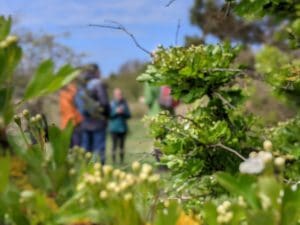
Find our upcoming foraging experiences here
So how can foraging build on the already enormous benefits of being in the great outdoors?
Well, apart from the obvious answer, which is the physical exercise of wandering about hedge bothering, on our journey to learning Why Foraging Is Good For Our Health And The Planet, foraging makes us really slow down and tune in to what is around us. The slower we go, we more we see. It’s a mindful practice, even if you don’t realise that you are being mindful.
Wild food is nutritionally denser than the supermarket food that we buy.
It may surprise some of you to hear that there are superfoods growing out there all around us. You don’t have to pay a premium in the shops for them. Just take the time to get to know them, with the two most obvious examples being Nettles and Dandelions. A bag of spinach and compared to the nutritional content of the same quantity of Nettles, (Rhutto et al., 2013), or Dandelions, (Di Noia, J, 2014), Spinach would come bottom of the class.
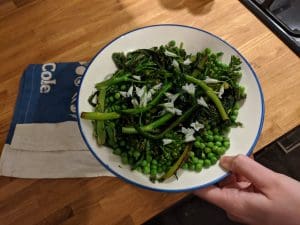
Recipe here for: Three-Cornered Leek & wilted Hogweed Stem with peas
Eating wild food connects us more closely to the seasons and we learn to appreciate and value the plants which appear at certain times of the year.
Remember that improved cognitive function I mentioned earlier? Eating seasonally makes us plan to store and preserve our harvest, just as our ancestors would once have done. They didn’t have the luxury of nipping to the shop if they needed to replace something in the store cupboard.
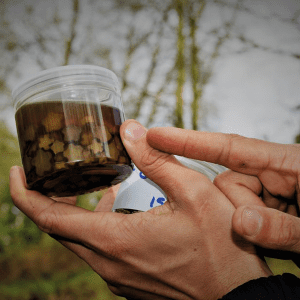
Bramble Stem Pickle Recipe right here
Additionally, wild food is far more sustainable than any shop bought food can ever be.
It hasn’t travelled half way around the world to get to the shops and isn’t wrapped in plastic. It will have grown exactly where it pleases, with no pesticides, or been part of an intensive agricultural practice which systematically destroys the soil, meaning future crops have to be sprayed with nitrogen and other fertilisers in order for them to grow.
Foraging is good for the planet as well as for ourselves.
As we start to notice all of the gifts Nature provides us with, we become more connected with the Earth it ignites a desire to protect the land and a sense of stewardship.
Because of this it is crucial that we pick plants sustainably and mindfully, thinking not just of ourselves, but all of the other creatures who depend on the plants we collect and the impact we are having on that plant community by our actions.
Here at Totally Wild we teach all about safe, sustainable practices. Why not join one of our foraging courses to get you started on your foraging journey.



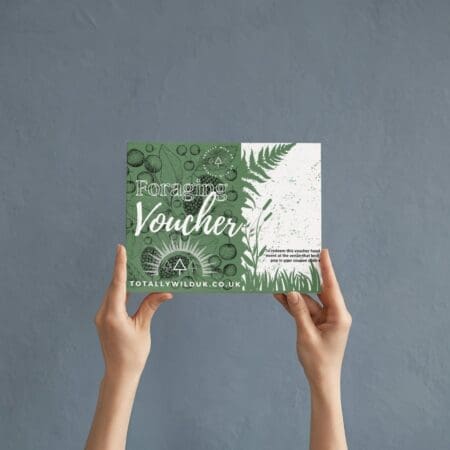


Leave a Reply
You must be logged in to post a comment.